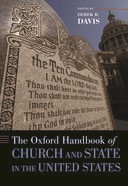 The Oxford Handbook of Church and State in the United States
The Oxford Handbook of Church and State in the United States
Contents
-
-
-
Introduction: Religious Pluralism as the Essential Foundation of America’s Quest for Unity and Order
-
-
-
-
-
-
-
-
-
-
-
-
-
Separation of Church and State Separation of Church and State
-
Cooperation between Sacred and Secular Cooperation between Sacred and Secular
-
Integration of Religion and Politics Integration of Religion and Politics
-
Accommodation of Civil Religion Accommodation of Civil Religion
-
Conclusion Conclusion
-
Endnotes Endnotes
-
Bibliography Bibliography
-
-
-
-
20 The Interplay of Law, Religion, and Politics in the United States
Get accessDerek H. Davis is the Dean of the College of Humanities and Dean of the Graduate School at the University of Mary Hardin-Baylor and Director of the UMHB Center for Religious Liberty. He was formerly Director of the J.M. Dawson Institute of Church-State Studies and Professor of Political Science, Baylor University, and Editor of the Journal of Church and State. He is the author or editor of seventeen books, including Original Intent and Religion and the Continental Congress, 1774-1789, and more than 150 articles in various journals and periodicals. He serves numerous organizations given to the protection of religious freedom in American and international contexts.
-
Published:02 January 2011
Cite
Abstract
This article discusses law, religion, and politics in the United States. It looks at these issues within the following contexts; 1) separation of the church and state; 2) cooperation between sacred and secular; 3) integration of religion and politics; and 4) accommodation of civil religion. Each of these four categories is important to the overall American public philosophy and to the confusing yet interconnected system that has as its goal the Good Society. Although conflicting in many aspects, the principles of the separation of church and state, cooperation between sacred and secular, integration of religion and politics, and accommodation of civil religion combine to provide a distinctive but significant contribution to America's public philosophy. While the role of religion in American public life has been controversial since its founding and may remain so, the separation–cooperation–integration–accommodation typology described in this article removes some of the hard edges from the controversy as it embraces elements of both conservative and liberal thought, of competing philosophical and theological beliefs, and of argument advanced by the separationists and anti-separationists. Such is the way the democracy should work—disparate elements coming together to produce a common good and to achieve the Good Society.
Sign in
Personal account
- Sign in with email/username & password
- Get email alerts
- Save searches
- Purchase content
- Activate your purchase/trial code
- Add your ORCID iD
Purchase
Our books are available by subscription or purchase to libraries and institutions.
Purchasing information| Month: | Total Views: |
|---|---|
| October 2022 | 4 |
| December 2022 | 8 |
| January 2023 | 4 |
| February 2023 | 1 |
| April 2023 | 2 |
| July 2023 | 1 |
| September 2023 | 1 |
| December 2023 | 1 |
| January 2024 | 3 |
| February 2024 | 6 |
| June 2024 | 1 |
| July 2024 | 2 |
| April 2025 | 2 |
Get help with access
Institutional access
Access to content on Oxford Academic is often provided through institutional subscriptions and purchases. If you are a member of an institution with an active account, you may be able to access content in one of the following ways:
IP based access
Typically, access is provided across an institutional network to a range of IP addresses. This authentication occurs automatically, and it is not possible to sign out of an IP authenticated account.
Sign in through your institution
Choose this option to get remote access when outside your institution. Shibboleth/Open Athens technology is used to provide single sign-on between your institution’s website and Oxford Academic.
If your institution is not listed or you cannot sign in to your institution’s website, please contact your librarian or administrator.
Sign in with a library card
Enter your library card number to sign in. If you cannot sign in, please contact your librarian.
Society Members
Society member access to a journal is achieved in one of the following ways:
Sign in through society site
Many societies offer single sign-on between the society website and Oxford Academic. If you see ‘Sign in through society site’ in the sign in pane within a journal:
If you do not have a society account or have forgotten your username or password, please contact your society.
Sign in using a personal account
Some societies use Oxford Academic personal accounts to provide access to their members. See below.
Personal account
A personal account can be used to get email alerts, save searches, purchase content, and activate subscriptions.
Some societies use Oxford Academic personal accounts to provide access to their members.
Viewing your signed in accounts
Click the account icon in the top right to:
Signed in but can't access content
Oxford Academic is home to a wide variety of products. The institutional subscription may not cover the content that you are trying to access. If you believe you should have access to that content, please contact your librarian.
Institutional account management
For librarians and administrators, your personal account also provides access to institutional account management. Here you will find options to view and activate subscriptions, manage institutional settings and access options, access usage statistics, and more.